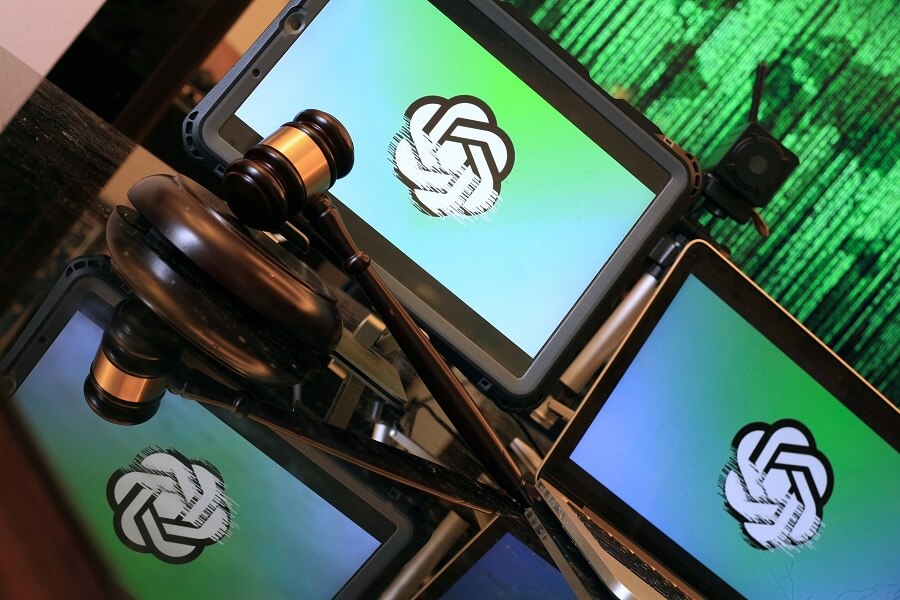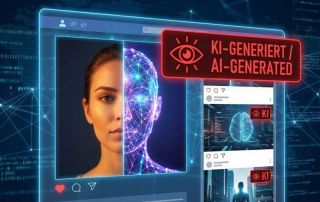A turning point in EU policy on regulating AI
In an unprecedented initiative, the European Union has taken a decisive step towards shaping the future of Artificial Intelligence (AI). This landmark law marks a milestone in global technology policy and positions the EU as a pioneer in creating a legal framework for the use and development of AI.
After months of intensive discussions, the representatives of the European Parliament and the member states have agreed on the cornerstones of the “AI Act“. This act is the first of its kind and is intended to provide a balanced framework for the use of AI technologies that promote innovation while addressing ethical and safety concerns.
A turning point in EU policy on regulating AI
In an unprecedented initiative, the European Union has taken a decisive step towards shaping the future of Artificial Intelligence (AI). This landmark law marks a milestone in global technology policy and positions the EU as a pioneer in creating a legal framework for the use and development of AI.
After months of intensive discussions, the representatives of the European Parliament and the member states have agreed on the cornerstones of the “AI Act“. This act is the first of its kind and is intended to provide a balanced framework for the use of AI technologies that promote innovation while addressing ethical and safety concerns.
The AI Act creates regulations for AI
The AI Act creates regulations for AI
Strict guidelines for risk areas
The “AI Act” places a particular focus on regulating AI applications in high-risk areas. This includes critical infrastructure, security services and human resources management systems. Strict human control mechanisms, detailed technical documentation and comprehensive risk management strategies should be implemented here. The goal is to ensure the integrity and reliability of AI-based systems while protecting public safety and privacy.
OpenAI – pioneer in AI technology
The importance and potential of AI have been clearly highlighted by companies like OpenAI, which caused an international stir with its chatbot ChatGPT. This machine learning example demonstrates how AI technology can be used to create complex texts such as essays or poems based on short inputs.
Different views within the EU
There were significant differences during the negotiation process, particularly on the regulation of basic models such as GPT. Countries such as Germany, France and Italy are committed to ensuring that only specific AI applications and not the underlying technology are regulated. The use of AI for facial recognition in the area of national security has also been a controversial topic.
Digital and Transport Minister Volker Wissing emphasized the need for an internationally coordinated approach in order not to hinder the development of start-ups such as Aleph Alpha and Mistral AI. The final approval of the European Parliament and the member states for the AI Act is considered likely.
The AI Act could serve as a model for other countries seeking a middle ground between the US’s more relaxed regulations and China’s strict regulations. With this law, the EU demonstrates its leadership role in global AI regulation.
Further detailed information about the AI Act can be found at official website of the European Parliament.
Strict guidelines for risk areas
The “AI Act” places a particular focus on regulating AI applications in high-risk areas. This includes critical infrastructure, security services and human resources management systems. Strict human control mechanisms, detailed technical documentation and comprehensive risk management strategies should be implemented here. The goal is to ensure the integrity and reliability of AI-based systems while protecting public safety and privacy.
OpenAI – pioneer in AI technology
The importance and potential of AI have been clearly highlighted by companies like OpenAI, which caused an international stir with its chatbot ChatGPT. This machine learning example demonstrates how AI technology can be used to create complex texts such as essays or poems based on short inputs.
Different views within the EU
There were significant differences during the negotiation process, particularly on the regulation of basic models such as GPT. Countries such as Germany, France and Italy are committed to ensuring that only specific AI applications and not the underlying technology are regulated. The use of AI for facial recognition in the area of national security has also been a controversial topic.
Digital and Transport Minister Volker Wissing emphasized the need for an internationally coordinated approach in order not to hinder the development of start-ups such as Aleph Alpha and Mistral AI. The final approval of the European Parliament and the member states for the AI Act is considered likely.
The AI Act could serve as a model for other countries seeking a middle ground between the US’s more relaxed regulations and China’s strict regulations. With this law, the EU demonstrates its leadership role in global AI regulation.
Further detailed information about the AI Act can be found at official website of the European Parliament.
Popular Posts
When your own voice becomes a weapon: The rise of AI-powered audio fraud
Artificial intelligence is making the classic grandparent scam more dangerous than ever. Criminals need only a few seconds of audio material from social media to perfectly clone voices. This article examines the technology behind "deepfake calls," presents real-life case studies, and explains effective protective measures such as the family safeword.
Smartphone Wi-Fi security: Public hotspots vs. home network
Is smartphone Wi-Fi a security risk? This article analyzes in detail threats such as evil twin attacks and explains protective measures for when you're on the go. We also clarify why home Wi-Fi is usually secure and how you can effectively separate your smart home from sensitive data using a guest network.
AI labeling on social media: Obligations & help with errors
No more deception: Instagram, TikTok, and YouTube are requiring users to label AI-generated content. We explain the technology, the risks for creators, and what to do if the algorithm mistakenly identifies your real photos as AI ("false positives").
Warum dein Excel-Kurs Zeitverschwendung ist – was du wirklich lernen solltest!
Hand aufs Herz: Wann hast du zuletzt eine komplexe Excel-Formel ohne Googeln getippt? Eben. KI schreibt heute den Code für dich. Erfahre, warum klassische Excel-Trainings veraltet sind und welche 3 modernen Skills deinen Marktwert im Büro jetzt massiv steigern.
Password madness: Why passkeys are the future
The era of passwords is ending. Passkeys offer protection against phishing and make logging in as easy as glancing at your phone. But what happens when you change phones? This article explains the technology and provides important tips for securely transferring your digital keys.
Windows 10: One month after the “End of Life” – assessment and options for action
On October 14, 2025, support for Windows 10 ended. Millions of PCs are now unprotected. We examine the current security situation, the new ESU subscription model, and show solutions for older hardware – from upgrade tricks to secure Linux alternatives.
Popular Posts
When your own voice becomes a weapon: The rise of AI-powered audio fraud
Artificial intelligence is making the classic grandparent scam more dangerous than ever. Criminals need only a few seconds of audio material from social media to perfectly clone voices. This article examines the technology behind "deepfake calls," presents real-life case studies, and explains effective protective measures such as the family safeword.
Smartphone Wi-Fi security: Public hotspots vs. home network
Is smartphone Wi-Fi a security risk? This article analyzes in detail threats such as evil twin attacks and explains protective measures for when you're on the go. We also clarify why home Wi-Fi is usually secure and how you can effectively separate your smart home from sensitive data using a guest network.
AI labeling on social media: Obligations & help with errors
No more deception: Instagram, TikTok, and YouTube are requiring users to label AI-generated content. We explain the technology, the risks for creators, and what to do if the algorithm mistakenly identifies your real photos as AI ("false positives").
Warum dein Excel-Kurs Zeitverschwendung ist – was du wirklich lernen solltest!
Hand aufs Herz: Wann hast du zuletzt eine komplexe Excel-Formel ohne Googeln getippt? Eben. KI schreibt heute den Code für dich. Erfahre, warum klassische Excel-Trainings veraltet sind und welche 3 modernen Skills deinen Marktwert im Büro jetzt massiv steigern.
Password madness: Why passkeys are the future
The era of passwords is ending. Passkeys offer protection against phishing and make logging in as easy as glancing at your phone. But what happens when you change phones? This article explains the technology and provides important tips for securely transferring your digital keys.
Windows 10: One month after the “End of Life” – assessment and options for action
On October 14, 2025, support for Windows 10 ended. Millions of PCs are now unprotected. We examine the current security situation, the new ESU subscription model, and show solutions for older hardware – from upgrade tricks to secure Linux alternatives.


































